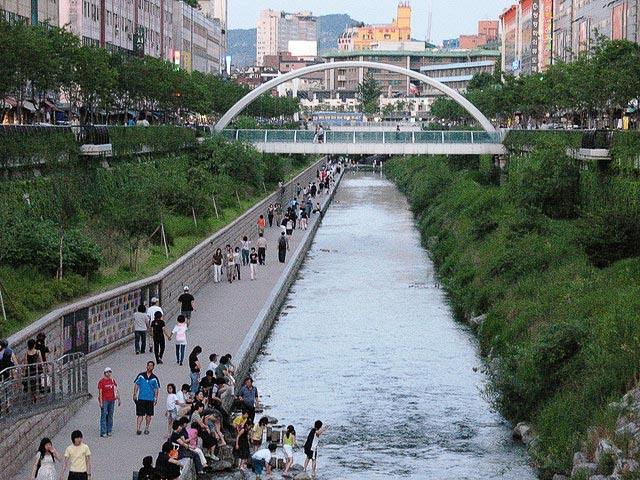America’s “crumbling” highways have become an inescapable topic of hand-wringing for just about anyone interested in infrastructure.
The American Society of Civil Engineers gives the country’s roads a paltry “D” rating.
Meanwhile, Congress hasn’t passed a long-term highway bill since 2005, and it hasn’t increased the federal gas tax since 1993.
All those factors have left many people decrying the stat of America’s highways. John Norquist, however, has a different perspective: why not let them crumble?
Norquist, the former Milwaukee mayor, earned national attention for successfully pushing for the removal of an elevated freeway in Milwaukee in 2002.
Today he’s continuing to preach that message to anyone who will listen. He’ll speak in Houston Sept. 22.
“A freeway is really a rural form,” says Norquist, the recently-retired longtime head of the Congress for the New Urbanism, one of the country’s most influential urban planning organizations.
“It’s meant to move vehicles at high speeds, but it tends to not do that when there’s too much traffic. It breaks down when you need it the most. At rush hour, it tends to fail. It concentrates traffic instead of distributing it.”
His message comes at a time when there’s a growing debate about the future of the Pierce Elevated, the section of I-45 that separates Houston’s Midtown and Downtown districts. Some advocates hope to demolish it, while others hope to transform it into a High Line-style park.
Houston’s not alone in rethinking the elevated roadway. Across the country, governments are moving to tear down urban highways. The Los Angeles Times wrote last year:
It's an idea that's catching on as cities across America try to revitalize downtowns decimated by highway construction and the departure of industry. Baltimore, Milwaukee and San Francisco have all torn down urban freeways and built parks or walkable areas in their place.
"It seems like it's gaining popularity," said Ted Shelton, a professor of architecture at the University of Tennessee who studies urban highway removal. "For so long, we've thought when a highway gets to capacity, we need to add a lane. But what we've learned is there's no way you can build enough capacity."
More cities — including Long Beach, Dallas, New Orleans, Nashville and Hartford, Conn. — are debating the idea of tearing down highways and creating something designed to keep people in the city, not send people out.
Norquist isn’t totally anti-highway. He sees them as useful in a few places: rural areas, rings around cities, connecting places over far-flung distances. But he believes they’re woefully inefficient tools for intracity travel. In fact, he believes they do more to encourage congestion than prevent it.
“It’s counterintuitive,” Norquist says. “You think the more road and the bigger road, the more you’re going to be able to drive fast. It takes a while to look at it differently.”
In Houston, he’ll make the case for an approach to transportation that focuses on the existing street grid, as well as transit, rather than major urban highways.
Norquist argues that the way we build road infrastructure matters not just for environmental reasons but for economic reasons too. Houston has a vested interest in being a place that’s attractive to the global business community. The street grid, not highways, helps create a community’s “sense of place” that makes communities seem desirable.
He said many people think his ideas are liberal, but he said it shouldn’t be seen as a political issue. It’s about economics.
“There’s no place more expensive to build a big, grade-separated highway than in a dense metropolitan area,” Norquist says.
At the same time, he argued, big freeways push economic value away from the city and concentrate traffic in a way that undermines the value of the street grid. He said places that are economically conservative understand his reasoning.
Switzerland is considered to be conservative, but it’s a city with strong connectivity and transit, Norquist said. Vancouver has no grade-separated freeways within its city limits. The policy is the result of conservative resistance to massive public works programs.
“It hasn’t hurt them to have a freeway-free street system,” Norquist says.
In Seoul, South Korea, the government has removed more than a dozen elevated freeways, including one that allowed for the development of stream that meanders through the urban core. “There were no traffic problems,” Norquist says. “A lot of it disappears into the complexity of the grid.”
But in Houston – the heart of the oil industry and the country’s unofficial sprawl capital – is it really practical to argue for the removal of highways?
Norquist acknowledges that the concept may be a difficult sell here. But leaders can at least prioritize other modes of transportation over highway expansion. Houston has historically been one of the most auto-centric cities in the country, but Norquist believes its bus network overhaul and new light rail lines are steps in the right direction.
Meanwhile, in this year’s Kinder Houston Area Survey, 43 percent of respondents said transit is the best long-term solution to dealing with Houston's traffic problems, compared to just 26 percent who picked highways. It seems residents are hungry for a change.
And as Norquist sees it, citizens and political leaders may not have much of a choice in the matter. The ongoing federal stalemate over infrastructure spending suggests highways aren’t much of a priority.
“The federal government has run out of money to throw away on projects that they don’t pay attention to,” Norquist said. “The federal government just doesn’t have the money.”

